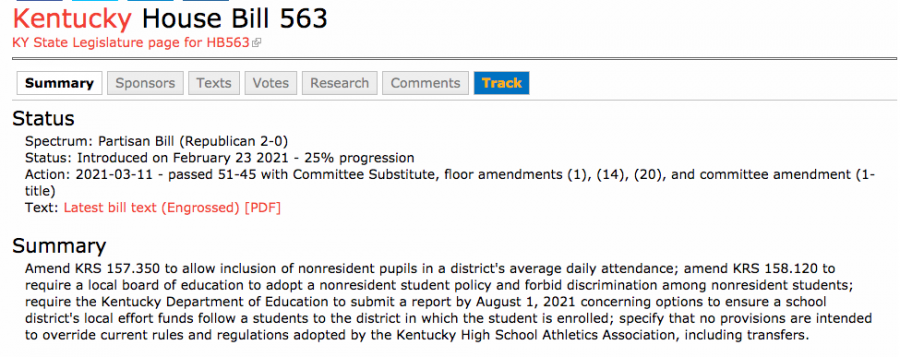UPDATE: Kentucky House of Representatives passes school choice bill
Text/summary of HB 563.
This is an update to a recent Hilltopper article on HB 149. Click here to read that story.
On March 11, 2021, the Kentucky House of Representatives passed House Bill (HB) 563 on a 51-45 floor vote, following almost three hours of debate.
HB 563 replaced HB 149, which proposed implementing an Education Opportunity Account program. Legislators took the main points from HB 149 and changed them to make a new bill, in an effort to make it more palatable for the majority of House members. Their strategy proved successful, as evidenced by HB 563’s passage through the lower chamber.
While HB 563 is extremely similar to HB 149, there are a few key amendments that change the scope of the bill. Notably, a floor amendment was offered to limit spending flexibility to Kenton, Fayette, and Jefferson Counties only. This amendment passed 49-45, despite pushback surrounding the potential impacts of this decision. Kenton, Fayette, and Jefferson Counties encompass three of the most populous areas of Kentucky, including Covington, Lexington, and Louisville, respectively. Proponents of the amendment argued that these highly-populous areas have the highest poverty rates, therefore making the bill’s provisions most effective there. However, critics rebuked this explanation, citing the widespread poverty that is also rampant throughout rural areas of the Commonwealth.
HB 563 also differs from HB 149 in the income cutoff for eligibility. In HB 149, the cutoff for income eligibility was close to $121,000 per year. HB 563 lowers this to $86,000, indicating that lower-income students may be better able to benefit. However, the negative impact on public school funding remains, leading many superintendents and other education professionals to continue opposition of the bill.
Some amendments were proposed, but ultimately not included. One such amendment was an attempt to provide state-funded full-day kindergarten. Currently, the state only funds half-day kindergarten. Additionally, a provision to allow Education Opportunity Account funds to be spent on private school tuition was struck down in a 45-52 vote.
While the meat of HB 563 appears less aggressive than HB 149, education experts and lobbyists believe it is just as problematic. According to the American Civil Liberties Union of Kentucky, the bill will “reduce funding, harm Kentucky students, and reduce transparency around how your tax dollars are spent.”
HB 563 still has a long way to go before it becomes law, and a Senate vote has not yet been scheduled. Stay up-to-date with The Hilltopper Online for further developments on this story.
Your donation will support the student journalists of Highlands High School. Your contribution will allow us to cover our annual website hosting costs.



